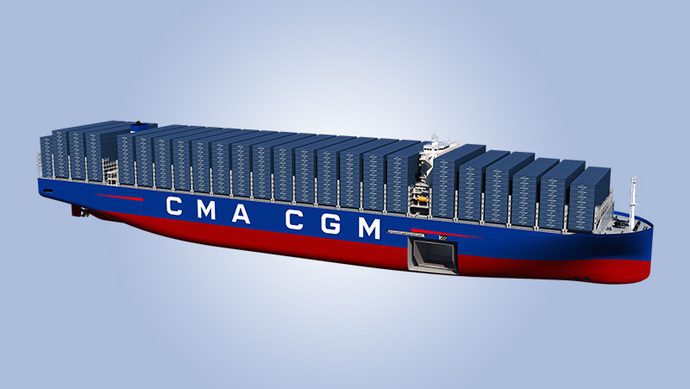
By Mike Wackett (The Loadstar) – A steel cutting ceremony took place in China last week on the hulls of the first two ships of CMA CGM’s order for nine 22,500 teu LNG-powered ULCVs, featuring a potentially game-changing bow design.
Alongside similar ULCVs being constructed for MSC in South Korea, these behemoths will be the largest containerships afloat, and the first to extend to 24 containers across the weather deck.
The French carrier’s new flagships will also be the first constructed with a “bulbless” bow, as the container line commits its future to slow-steaming.
An elegant protruding bulb shape at the bow has been a feature of containerships for decades, but the new tugboat-like design could become the new normal on liner trades where lower unit costs have won out over fast transit times.
The bulbous bow works by creating an artificial wave, modifying the water flow around the hull, which reduces drag and increases speed and fuel efficiency. Studies have put the fuel efficiency gain at up to 15% at near full speed.
However, consultant Alphaliner notes, the advantages of a bulbous bow containership – more complex and therefore more expensive – have waned with the advent of slow-steaming in the past decade, causing the fuel efficiency percentage gain to drop significantly.
Moreover, vessels that sail at less than full draught – with backloads of empty containers, for example – also see the advantages of a bulbous bow eroded.
This has prompted the retrofitting of replacement bows, designed specifically to be more efficient at slower speeds, to a number of container vessels over the past few years.
Alphaliner also notes that, at the time of CMA CGM’s $1.2bn order in September, the images released of the ULCVs were of a conventional bulbous bow design. New images, provided at Hudong Zhonghua Shipyard cutting ceremony, show a vertical stem design.
Notwithstanding the unit cost advantage of deploying LNG-powered vessels, CMA CGM is clearly seeking every opportunity to ensure its new ships will be the most cost-efficient in the industry.
Since September, the price of IFO 380 heavy fuel oil has risen from some $320 per tonne to $440, and with predictions of further spikes to come, the rise in the cost of bunkers is currently the biggest risk to sustained profitability in the industry. German rating agency Scope said this week it expects a rise of about 25% in bunker prices this year, compared with 2017, “squeezing the thin profit margins” of carriers.
“Increased crude oil and bunker prices and flat shipping rates will continue to put severe pressure on the operating profitability of older, less-efficient vessels,” said the Scope report.
Moreover, with the IMO’s 0.5% sulphur cap regulations coming into force on 1 January 2020, ocean carriers must endeavour to future-proof their fleets from the impact of a further potential 50% jump in fuel costs.
The Loadstar is fast becoming known at the highest levels of logistics and supply chain management as one of the best sources of influential analysis and commentary.
Check them out at TheLoadstar.co.uk, or find them on Facebook and Twitter.

 Join The Club
Join The Club











